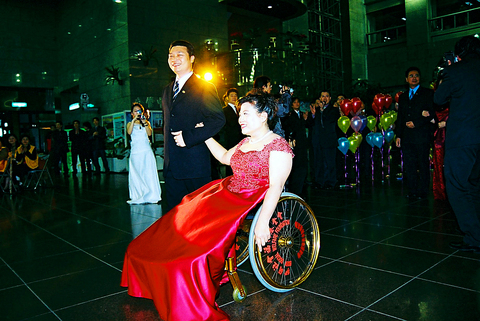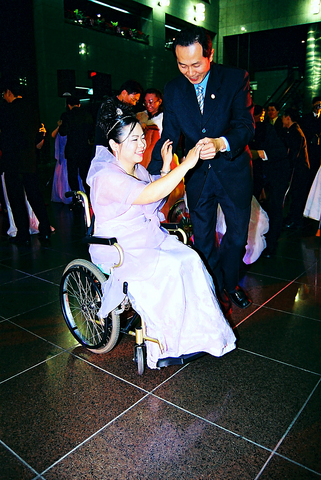The ladies in the Kuang Ching Foundation (
"What are we going to do about your hair?"
The party these women were so eagerly anticipating is tomorrow night's "incomparable" ball for the disabled (

PHOTOS COURTESY OF KUANG CHING FOUNDATION
The event, which coincides with Chinese Valentine's Day, will be held at the Ketagalan Cultural Hall in Xin Beitou (
"Originally the idea was just to have dancing, so why did we think of having everybody dress up so nice and pretty? Because we realized so many disabled friends thought it impossible," said Kuang Ching staff member Chen Ching-chy (
But Chen, whose torso is also curved, had been to many formal events before, so she knew it was possible. She felt that more than just a dance party, what many disabled friends needed was a chance to get done up to the nines.

Last year's ball, the first event of its kind in Taiwan, was a smashing success. The dancing went on well into the night, and many a belle left the ball with more confidence than when she had come.
"One of our friends said that before, when people told her she was pretty, she thought it was just to comfort her. But on that night when people told her she was pretty, she responded with `Thank you,' because she knew it was true," Chen said.
Last year's ball had 50 attendees, most of whom were women. This year 75, people of all ages and various disabilities, inclu-ding about 20 men, have already registered. There will also be 75 volunteers from Chlitina International Trading serving as dance partners and beauticians. The evening will begin at 6pm with a procession down the red carpet, where each participant will get his or her moment in the spotlight. Besides dancing, the party will include performances, speeches and a very big cake.

PHOTO COURTESY OF KUANG CHING FOUNDATION
In excess of NT$250,000 was fundraised to put on the event. According to Chen, finding the right venue for the ball was no easy task as most places are only partially wheelchair accessible. Doing something about the sad state of wheelchair accessibility in Taipei, however, is the domain of various other foundations, Chen said.
The Kuang Ching Foundation has been around for 16 years providing the disabled community with services such as skills classes, film festivals and a hotline. After months of fundraising, the hotline will become a 0800 number this September. Volunteers answering the phones offer advice on how to adjust to life with a
disability as well as just a sympathetic ear.
Chen told the story of one disabled individual who had to scrape together NT$100 to buy a phone card because his brother and sister-in-law whom he lived with wouldn't allow him to call from the home phone.
This story and many others of disabled people overcoming obstacles are what inspire Chen and her co-workers at the Kuang Ching Foundation to challenge the community with new activities that some may have thought impossible.
"Actually, there's so much that disabled friends can do," Chen said.
The Ketagalan Cultural Hall is at B1, 3-1 Zhongshan Rd (

That US assistance was a model for Taiwan’s spectacular development success was early recognized by policymakers and analysts. In a report to the US Congress for the fiscal year 1962, former President John F. Kennedy noted Taiwan’s “rapid economic growth,” was “producing a substantial net gain in living.” Kennedy had a stake in Taiwan’s achievements and the US’ official development assistance (ODA) in general: In September 1961, his entreaty to make the 1960s a “decade of development,” and an accompanying proposal for dedicated legislation to this end, had been formalized by congressional passage of the Foreign Assistance Act. Two

March 31 to April 6 On May 13, 1950, National Taiwan University Hospital otolaryngologist Su You-peng (蘇友鵬) was summoned to the director’s office. He thought someone had complained about him practicing the violin at night, but when he entered the room, he knew something was terribly wrong. He saw several burly men who appeared to be government secret agents, and three other resident doctors: internist Hsu Chiang (許強), dermatologist Hu Pao-chen (胡寶珍) and ophthalmologist Hu Hsin-lin (胡鑫麟). They were handcuffed, herded onto two jeeps and taken to the Secrecy Bureau (保密局) for questioning. Su was still in his doctor’s robes at

Last week the Democratic Progressive Party (DPP) said that the budget cuts voted for by the China-aligned parties in the legislature, are intended to force the DPP to hike electricity rates. The public would then blame it for the rate hike. It’s fairly clear that the first part of that is correct. Slashing the budget of state-run Taiwan Power Co (Taipower, 台電) is a move intended to cause discontent with the DPP when electricity rates go up. Taipower’s debt, NT$422.9 billion (US$12.78 billion), is one of the numerous permanent crises created by the nation’s construction-industrial state and the developmentalist mentality it

Experts say that the devastating earthquake in Myanmar on Friday was likely the strongest to hit the country in decades, with disaster modeling suggesting thousands could be dead. Automatic assessments from the US Geological Survey (USGS) said the shallow 7.7-magnitude quake northwest of the central Myanmar city of Sagaing triggered a red alert for shaking-related fatalities and economic losses. “High casualties and extensive damage are probable and the disaster is likely widespread,” it said, locating the epicentre near the central Myanmar city of Mandalay, home to more than a million people. Myanmar’s ruling junta said on Saturday morning that the number killed had